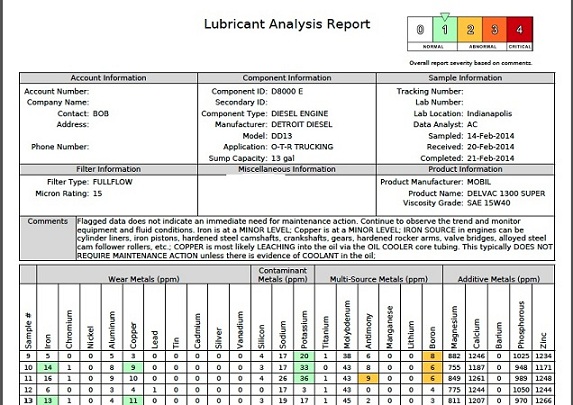It's a Team's Life
Oil Analysis
During my time as a diesel mechanic I learned that regular oil analysis, be it engine, transmission or differential, can identify a problem developing before it becomes a major breakdown. When my employer purchased a new piece of equipment, it was required, by the manufacturer, an oil analysis be done at certain scheduled intervals. With this requirement I learned about oil analysis and what it can tell you about each component.
The samples were taken and shipped off to the lab for analysis. We would get a report back in a few days with all kinds of information I didn't understand. What I did know was that if there was a problem developing there would be a flag on the report giving a possible cause and what needed to be done. One time the sample was really bad and we got a phone call recommending we shut down that piece of equipment immediately, which we did. Our dealer was notified at the same time and there was a technician at the shop the next morning, He had parts with him to make the repairs, we changed the oil and were running again that afternoon. I feel that if we had not been doing oil analysis that machine would have had a catastrophic failure and could have been down for weeks and it is unknown how much it would have cost to repair.
So what does an oil analysis report tell you, in this case we will look at an engine report. I will say that I'm no expert on these reports and have had no formal training on how to read them, but I kinda get the idea behind them and understand what they are telling me.
On our report the wear metals are listed first. So what are wear metals, wear metals is the result of friction and/or corrosion in the component (engine). Regularly scheduled analysis of oil can determine wear patterns and allow you to do preventive maintenance, increasing reliability. For a list of wear metals and where they might be coming from go to www.cashmanequipment.com/bently/publications/appnotes/app31.php , I found this very enlightening.
A good report will have a few samples to compare to each other in order to establish a wear pattern. Most labs have predetermined the amount of wear metals that are "normal" (measured in parts per million, ppm) for the miles or hours on the engine. There are wear metals in all components, if it runs or has moving parts it's going to wear. Sampling is a way to tell if it's wearing normally or something is causing accelerated wear.
Contaminant metals are next, also measured in ppm. Contaminants are anything that shouldn't be in the oil or one of the additives in the oil. For the most part the lab is looking for silicone (dirt), sodium (salt) and potassium, sodium and potassium are components of coolants.
Multi-source metals and additive metals, both measured in ppm, determine if the additive package is still usable and how much is still in the oil. They can also be an indicator of what oil are being used, different oil companies use different additives to do the same thing.
Sample info is next, this information gives you a sample date, lube time, unit mileage, how much oil was added during run time, lube change and filter change. Contaminants, measured in a percentage of volume. Fuel, soot and water are the primary contaminants looked for here.
Fluid properties are the analysis of how well the oil is dealing with the heat and pressure. Viscosity, oxidation, nitration and base number are checked and reported here. For the most part oil does not go bad, it gets dirty or the additive package gets used up. Oil analysis will tell you when it's time for an oil change or it can go some more. I do recommend you follow the manufacturers service schedule but an analysis will tell you if it needs service earlier.
For a much
better explanation of how to read an analysis report and what each section
means to you go to
http://www.oil-lab.com/downloads/How_to_Read_Oil_Analysis_Reports.pdf.
These folks do a great job of explaining the whole report much better than I
can. Doing an oil analysis every time the oil is changed, to me is a must, I
also do one at the midway point of my scheduled oil change. This midway check
lets me know how the oil is doing as well as our engines health.

Bob & Linda Caffee
TeamCaffee

Saint Louis MO
Expediters since January 2005
Expediting isn't just trucking, it's a lifestyle; 

Expediting isn't just a lifestyle, it's an adventure;

Expediting isn't just an adventure, it's a job;

Expediting isn't just a job, it's a business.
